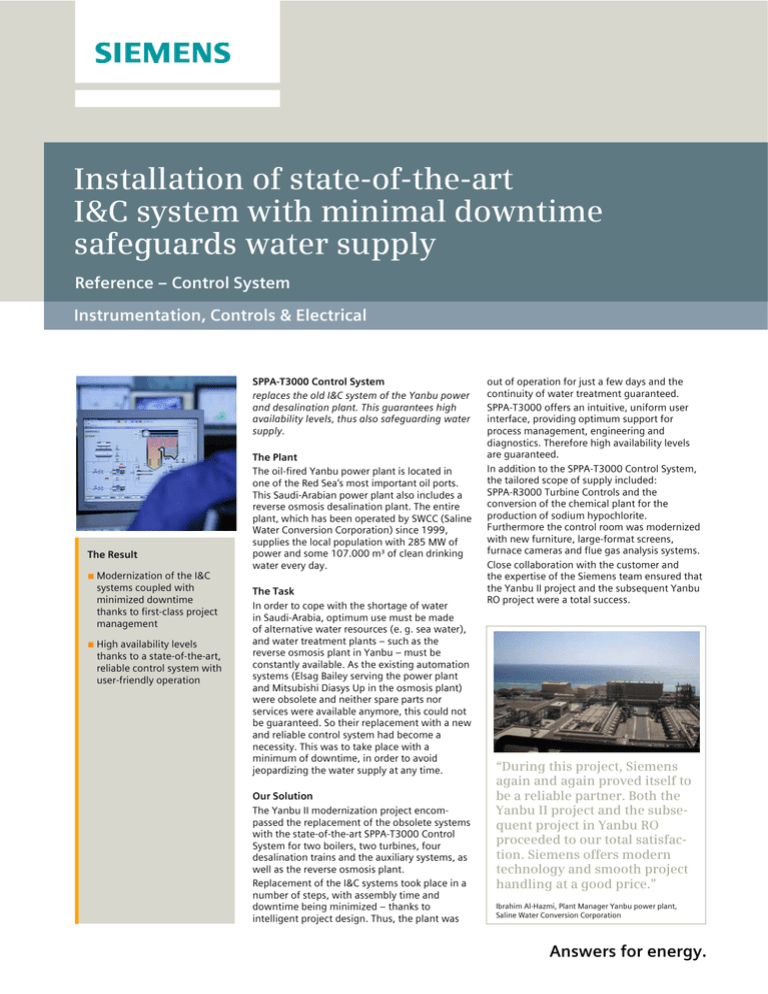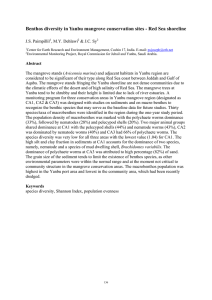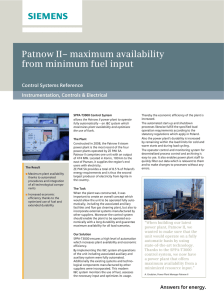
Installation of state-of-the-art
I&C system with minimal downtime
safeguards water supply
Reference – Control System
Instrumentation, Controls & Electrical
SPPA-T3000 Control System
replaces the old I&C system of the Yanbu power
and desalination plant. This guarantees high
availability levels, thus also safeguarding water
supply.
The Result
■ Modernization of the I&C
systems coupled with
minimized downtime
thanks to first-class project
management
■ High availability levels
thanks to a state-of-the-art,
reliable control system with
user-friendly operation
The Plant
The oil-fired Yanbu power plant is located in
one of the Red Sea‘s most important oil ports.
This Saudi-Arabian power plant also includes a
reverse osmosis desalination plant. The entire
plant, which has been operated by SWCC (Saline
Water Conversion Corporation) since 1999,
supplies the local population with 285 MW of
power and some 107.000 m³ of clean drinking
water every day.
The Task
In order to cope with the shortage of water
in Saudi-Arabia, optimum use must be made
of alternative water resources (e. g. sea water),
and water treatment plants – such as the
reverse osmosis plant in Yanbu – must be
constantly available. As the existing automation
systems (Elsag Bailey serving the power plant
and Mitsubishi Diasys Up in the osmosis plant)
were obsolete and neither spare parts nor
services were available anymore, this could not
be guaranteed. So their replacement with a new
and reliable control system had become a
necessity. This was to take place with a
minimum of downtime, in order to avoid
jeopardizing the water supply at any time.
Our Solution
The Yanbu II modernization project encompassed the replacement of the obsolete systems
with the state-of-the-art SPPA-T3000 Control
System for two boilers, two turbines, four
desalination trains and the auxiliary systems, as
well as the reverse osmosis plant.
Replacement of the I&C systems took place in a
number of steps, with assembly time and
downtime being minimized – thanks to
intelligent project design. Thus, the plant was
out of operation for just a few days and the
continuity of water treatment guaranteed.
SPPA-T3000 offers an intuitive, uniform user
interface, providing optimum support for
process management, engineering and
diagnostics. Therefore high availability levels
are guaranteed.
In addition to the SPPA-T3000 Control System,
the tailored scope of supply included:
SPPA-R3000 Turbine Controls and the
conversion of the chemical plant for the
production of sodium hypochlorite.
Furthermore the control room was modernized
with new furniture, large-format screens,
furnace cameras and flue gas analysis systems.
Close collaboration with the customer and
the expertise of the Siemens team ensured that
the Yanbu II project and the subsequent Yanbu
RO project were a total success.
“During this project, Siemens
again and again proved itself to
be a reliable partner. Both the
Yanbu II project and the subsequent project in Yanbu RO
proceeded to our total satisfaction. Siemens offers modern
technology and smooth project
handling at a good price.”
Ibrahim Al-Hazmi, Plant Manager Yanbu power plant,
Saline Water Conversion Corporation
Answers for energy.
Published by and copyright © 2013:
Siemens AG, Energy Sector
Freyeslebenstrasse 1
91058 Erlangen, Germany
For more information contact
sppa-t3000.energy@siemens.com
www.siemens.com/energy/sppa-t3000
Siemens Energy, Inc.
Instrumentation, Controls, & Electrical
1345 Ridgeland Parkway, Suite 116
Alpharetta, GA 30004, USA
T3_FR_Yanbu_e_V1-0
Order no. E50001-G230-A340-X-4A00
Printed in Germany
Dispo 05401, c4bs-Nr. 7465
Printed on elementary chlorine-free
bleached paper.
Unrestricted
AL:N ECCN:N
All rights reserved.
Trademarks mentioned in this document are
the property of Siemens AG, its affiliates, or
their respective owners.
Subject to change without prior notice.
The information in this document contains
general descriptions of the technical options
available, which may not apply in all cases.
The required technical options should
therefore be specified in the contract.











